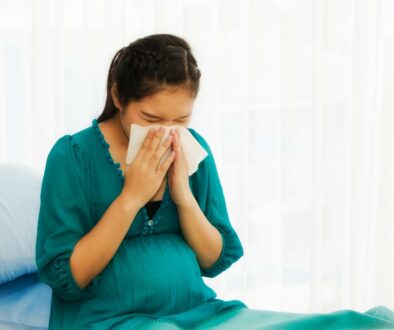Your Guide to Pregnancy in a Time of COVID-19 and the Flu
Posted April 3, 2020. Due to the developing nature of the virus, some information may be outdated. Always consult reliable sources for the most up-to-date information. We have listed reliable sources throughout this article.
The coronavirus seemed to appear from nowhere, quickly making its way across the globe and affecting every aspect of American life—and the lives of those around the globe. It also coincides with the flu season.
We know for those of you who are pregnant, this is a particularly stressful time. We want to assure you that we are doing everything in our power to ensure both our patients and employees are safe through adjusting our office policies and offering things such as telemedicine visits.
We’re sure you have questions about COVID-19 and pregnancy. However, the research is only in the initial stages. The data remains mostly observational and very limited.
Pregnancy and COVID-19
When it comes to the effect of COVID-19 on pregnancy or the unborn fetus, researchers don’t have any concrete conclusions.
According to the American College of Obstetricians and Gynecologists and the Centers for Disease Control, there is very little data about COVID-19’s effect on those who are pregnant or their babies. There are also very few studies about if pregnant women are at greater risk of having severe illness related to catching the coronavirus.
However, the flu and SARS, for which pregnant women are at greater risk, are also respiratory diseases like the coronavirus. Those who are pregnant are at greater risk of respiratory infections like the flu and SARS. Therefore, for the sake of safety, we suggest that our pregnant patients exercise extreme caution during this COVID-19 crisis.
Stay home if possible – this is the best thing you can do. Maintain social distancing if you go out. Wash your hands thoroughly (20 seconds with soap and warm water). Don’t touch your face after you have washed your hands.
Since one of the symptoms of COVID-19 is a fever, we believe the simplest solution is to do everything in your power to prevent getting the coronavirus in the first place. If you’re pregnant, this means treating yourself as someone at a higher risk.
It also means you should call our office before a visit if you are exhibiting any of the signs of the coronavirus. We have alternatives to in-office visits, including telemedicine.
Pregnancy and the Flu
Flu season returns every year, so unlike COVID-19, we are much more familiar with this virus and how it behaves. We’re also more attuned to how it affects those who are pregnant. We know that:
- Getting a flu shot reduces the risk of having the flu. We recommend that all pregnant women have a flu shot during flu season.
- Flu is likely to be more severe in pregnant women than in their non-pregnant peers
- Changes in the immune system make pregnant women more susceptible to the flu
- Fever can cause neural tube defects early in the pregnancy
What is a Neural Tube Defect?
The neural tube is part of the baby’s developing central nervous system, and therefore, any problems with the neural tube can have devastating effects on the baby’s brain or spinal cord. In many cases, these defects can happen even before you know you’re pregnant.
However, studies show that taking 400 mcg of folic acid every day in your early pregnancy—and when you are trying to get pregnant—lowers the risk of developing neural tube defects.
Two common neural tube defects are spina bifida, where the spinal column hasn’t closed completely and anencephaly, where a large portion of the brain is missing.
Updates in State Flu Cases
Currently, North Carolina is reporting high numbers of flu cases across the state. You can keep track of the current flu activity in our area by reading the Centers for Disease Control’s weekly flu update.
The best way to avoid the flu? Get vaccinated with a flu shot every year.
Chapel Hill OBGYN Is Always Ready to Serve You
We don’t know the full effect of COVID-19, and in most cases, physicians and scientists will continue to conduct research on this coronavirus after the current crisis ends. Until there are more concrete answers on how it affects pregnant women, we’re encouraging all our patients to be very cautious.
We want you to know that we are still available to answer any of your questions, and we can even schedule a telemedicine appointment. Just contact us for information.
For more than 40 years, Chapel Hill OBGYN has served women in the Triangle area, sharing the joy of little miracles and supporting them during challenges. Our board-certified physicians and certified nurse midwives bring together the personal experience and convenience of a private practice with the state-of-the-art resources found at larger organizations. To schedule an appointment, please contact us for more information.




